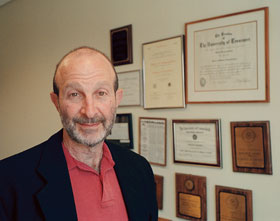  |
| HOME | THIS ISSUE | CALENDAR | GRANTS | BACK ISSUES | < BACK | NEXT > |
Entrepreneurship focus of Lubatkin’s researchby Earl Flowers - February 27, 2006 |
||||
|
Michael Lubatkin’s career challenges have ranged from the complexities of teaching elementary school to researching the “dark side of household altruism” in family-owned firms. Lubatkin, a professor of business management, was already an internationally recognized scholar by 2000, when he was gently nudged in a new research direction with his appointment to the Thomas J. and Bette Wolff Family Chair in Strategic Entrepreneurship. That year, he was also inducted into the prestigious Academy of Management Hall of Fame, largely for his research on mergers and acquisitions. The endowed chair, established by the Wolff family to advance the field of science and practice of entrepreneurship, presented an opportunity to add academic rigor to the largely uncharted field of entrepreneurship, Lubatkin says. The science and practice of entrepreneurship was an area Lubatkin had already begun to research when he was appointed to the Wolff Chair. He found, he says, “baskets of similar knowledge” he could transfer from his experience in mergers and acquisition to more entrepreneurial topics. It’s not the first time Lubatkin’s career has taken a new direction. Teaching was his first professional pursuit. He holds a master’s degree in elementary education, and taught third- and fifth-graders in what he calls a “previous lifetime.” His UConn career began in 1983, after he earned a doctorate in business administration from the University of Tennessee and spent two years as an assistant professor at Wichita State University in Kansas. At UConn, Lubatkin teaches both undergraduate and graduate courses, including a doctoral seminar on strategic management. He also is a frequent speaker and presenter at regional, national, and international conferences, and regularly teaches in M.B.A. programs in France, Israel, Switzerland, and Sweden. He describes himself as “a social scientist that just happens to be studying business organizations.” “Prior to the Wolff Chair, the big firms were the ones that captured my attention,” he says. “There, you are dealing with rational, bureaucratic systems of administrative controls and incentives to create a sense of order and uniformity through a multi- divisional, multi-product, global organization.”
Small to medium-size private firms tend to have a less formalized system, he says, and thus have the potential for becoming erratic, unpredictable, and subject to power plays. “Family firms are an extension of the family and the exchange of relationships that define the household,” Lubatkin says. “They are acted out in somewhat similar forms when the parent hires the children and extended family members to take privileged positions within the firms.” Some economists argue that the family firm represents an efficient form of governance, Lubatkin says, because the owners are also the managers, and the people they manage are those with whom they have a long history of contact. In these enterprises, according to economists, expensive controlling mechanisms and compensation incentives should be unnecessary, because conduct and behavior are likely to be somewhat predictable. His research doesn’t support this argument. “Some of what my co-authors and I have theorized and then empirically found is that many family firms don’t do well because they are vulnerable to the dark side of household altruism,” he says. “The parent-owner often has difficulty disciplining and setting expectations for family members because of how it might affect the family,” Lubatkin says, “and creates a kind of environment where the family members draw perquisites that drain the firm of the resources it requires to be a vital organization. “The parent-owner is also prone to being confused in terms of the objectives of the firm,” he says. “Is it to compete in the competitive market arena, or is it to provide secure employment for the family?” |
| ADVANCE HOME UCONN HOME |

